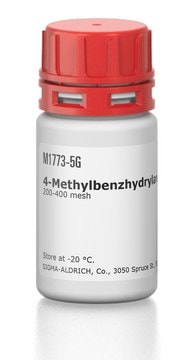M7635
Alkyltrimethylammonium bromide
≥95% (TLC)
Synonym(s):
Cetrimide (per BP)
Sign Into View Organizational & Contract Pricing
All Photos(4)
About This Item
Recommended Products
General description
Alkyltrimethylammonium bromide is a surfactant and can be used to study the forces and stability of foam films produced from soluble cationic surfactants.
Application
Alkyltrimethylammonium bromide has been used in a study to assess the adsorption of sugar surfactants at the air/water interface. It has also been used in a study to investigate dynamical features in cationic micelles.
Other Notes
Predominantly C14H29N(CH3)3Br but also contains C12 and C16 homologs.
Signal Word
Danger
Hazard Statements
Precautionary Statements
Hazard Classifications
Acute Tox. 4 Oral - Aquatic Acute 1 - Aquatic Chronic 1 - Eye Dam. 1 - Skin Irrit. 2 - STOT RE 2 Oral - STOT SE 3
Target Organs
Gastrointestinal tract, Respiratory system
Storage Class Code
11 - Combustible Solids
WGK
WGK 3
Flash Point(F)
Not applicable
Flash Point(C)
Not applicable
Choose from one of the most recent versions:
Already Own This Product?
Find documentation for the products that you have recently purchased in the Document Library.
Customers Also Viewed
Disjoining Pressures and Film Stability of Alkyltrimethylammonium Bromide Foam Films
Bergeron, V.
Langmuir, 13, 3474-3484 (1997)
V K Sharma et al.
The journal of physical chemistry. B, 116(30), 9007-9015 (2012-07-11)
Chain length is one of the parameters controlling the structural arrangement of micelle monomers, such that one can tailor the monomers for different applications, but the effect of chain length on the dynamical behavior of micelles is unknown. In this
Imre Varga et al.
Journal of colloid and interface science, 379(1), 78-83 (2012-05-23)
The adsorption isotherms of n-decyl-β-D-glucoside (β-C(10)G(1)) as well as various n-alkyl-β-D-maltosides (β-C(n)G(2)) with n=8, 10, 12 and 14 were determined from surface tension measurements. Based on the analysis of the adsorption isotherms, the total free energy change of adsorption was
Our team of scientists has experience in all areas of research including Life Science, Material Science, Chemical Synthesis, Chromatography, Analytical and many others.
Contact Technical Service















